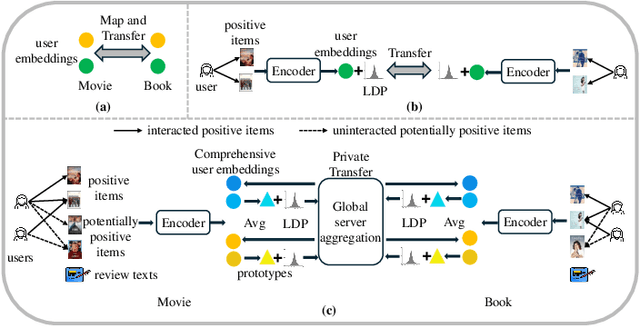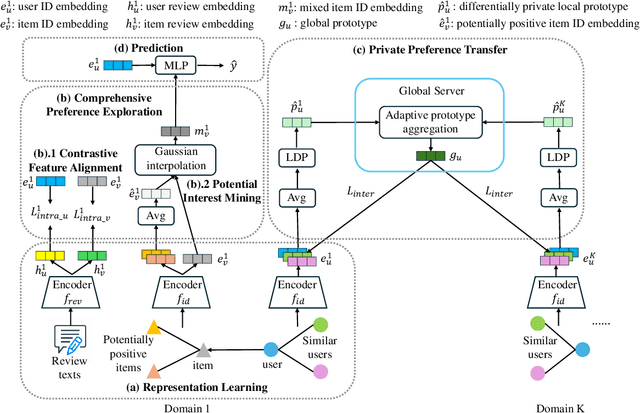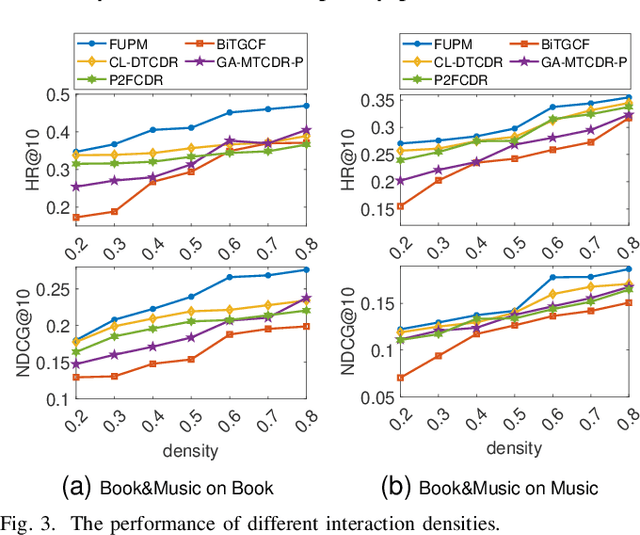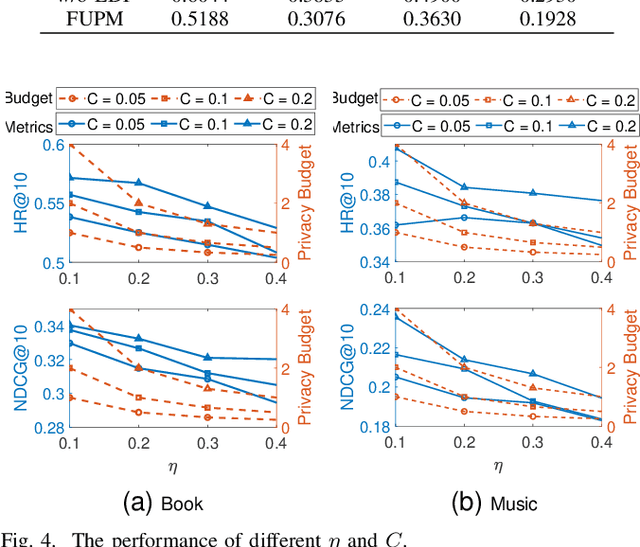Quangui Zhang
Federated Prototype-based Contrastive Learning for Privacy-Preserving Cross-domain Recommendation
Sep 05, 2024



Abstract:Cross-domain recommendation (CDR) aims to improve recommendation accuracy in sparse domains by transferring knowledge from data-rich domains. However, existing CDR methods often assume the availability of user-item interaction data across domains, overlooking user privacy concerns. Furthermore, these methods suffer from performance degradation in scenarios with sparse overlapping users, as they typically depend on a large number of fully shared users for effective knowledge transfer. To address these challenges, we propose a Federated Prototype-based Contrastive Learning (CL) method for Privacy-Preserving CDR, named FedPCL-CDR. This approach utilizes non-overlapping user information and prototypes to improve multi-domain performance while protecting user privacy. FedPCL-CDR comprises two modules: local domain (client) learning and global server aggregation. In the local domain, FedPCL-CDR clusters all user data to learn representative prototypes, effectively utilizing non-overlapping user information and addressing the sparse overlapping user issue. It then facilitates knowledge transfer by employing both local and global prototypes returned from the server in a CL manner. Simultaneously, the global server aggregates representative prototypes from local domains to learn both local and global prototypes. The combination of prototypes and federated learning (FL) ensures that sensitive user data remains decentralized, with only prototypes being shared across domains, thereby protecting user privacy. Extensive experiments on four CDR tasks using two real-world datasets demonstrate that FedPCL-CDR outperforms the state-of-the-art baselines.
Federated User Preference Modeling for Privacy-Preserving Cross-Domain Recommendation
Aug 26, 2024



Abstract:Cross-domain recommendation (CDR) aims to address the data-sparsity problem by transferring knowledge across domains. Existing CDR methods generally assume that the user-item interaction data is shareable between domains, which leads to privacy leakage. Recently, some privacy-preserving CDR (PPCDR) models have been proposed to solve this problem. However, they primarily transfer simple representations learned only from user-item interaction histories, overlooking other useful side information, leading to inaccurate user preferences. Additionally, they transfer differentially private user-item interaction matrices or embeddings across domains to protect privacy. However, these methods offer limited privacy protection, as attackers may exploit external information to infer the original data. To address these challenges, we propose a novel Federated User Preference Modeling (FUPM) framework. In FUPM, first, a novel comprehensive preference exploration module is proposed to learn users' comprehensive preferences from both interaction data and additional data including review texts and potentially positive items. Next, a private preference transfer module is designed to first learn differentially private local and global prototypes, and then privately transfer the global prototypes using a federated learning strategy. These prototypes are generalized representations of user groups, making it difficult for attackers to infer individual information. Extensive experiments on four CDR tasks conducted on the Amazon and Douban datasets validate the superiority of FUPM over SOTA baselines. Code is available at https://github.com/Lili1013/FUPM.
Causal Disentanglement for Regulating Social Influence Bias in Social Recommendation
Mar 06, 2024Abstract:Social recommendation systems face the problem of social influence bias, which can lead to an overemphasis on recommending items that friends have interacted with. Addressing this problem is crucial, and existing methods often rely on techniques such as weight adjustment or leveraging unbiased data to eliminate this bias. However, we argue that not all biases are detrimental, i.e., some items recommended by friends may align with the user's interests. Blindly eliminating such biases could undermine these positive effects, potentially diminishing recommendation accuracy. In this paper, we propose a Causal Disentanglement-based framework for Regulating Social influence Bias in social recommendation, named CDRSB, to improve recommendation performance. From the perspective of causal inference, we find that the user social network could be regarded as a confounder between the user and item embeddings (treatment) and ratings (outcome). Due to the presence of this social network confounder, two paths exist from user and item embeddings to ratings: a non-causal social influence path and a causal interest path. Building upon this insight, we propose a disentangled encoder that focuses on disentangling user and item embeddings into interest and social influence embeddings. Mutual information-based objectives are designed to enhance the distinctiveness of these disentangled embeddings, eliminating redundant information. Additionally, a regulatory decoder that employs a weight calculation module to dynamically learn the weights of social influence embeddings for effectively regulating social influence bias has been designed. Experimental results on four large-scale real-world datasets Ciao, Epinions, Dianping, and Douban book demonstrate the effectiveness of CDRSB compared to state-of-the-art baselines.
A Privacy-Preserving Framework with Multi-Modal Data for Cross-Domain Recommendation
Mar 06, 2024Abstract:Cross-domain recommendation (CDR) aims to enhance recommendation accuracy in a target domain with sparse data by leveraging rich information in a source domain, thereby addressing the data-sparsity problem. Some existing CDR methods highlight the advantages of extracting domain-common and domain-specific features to learn comprehensive user and item representations. However, these methods can't effectively disentangle these components as they often rely on simple user-item historical interaction information (such as ratings, clicks, and browsing), neglecting the rich multi-modal features. Additionally, they don't protect user-sensitive data from potential leakage during knowledge transfer between domains. To address these challenges, we propose a Privacy-Preserving Framework with Multi-Modal Data for Cross-Domain Recommendation, called P2M2-CDR. Specifically, we first design a multi-modal disentangled encoder that utilizes multi-modal information to disentangle more informative domain-common and domain-specific embeddings. Furthermore, we introduce a privacy-preserving decoder to mitigate user privacy leakage during knowledge transfer. Local differential privacy (LDP) is utilized to obfuscate the disentangled embeddings before inter-domain exchange, thereby enhancing privacy protection. To ensure both consistency and differentiation among these obfuscated disentangled embeddings, we incorporate contrastive learning-based domain-inter and domain-intra losses. Extensive Experiments conducted on four real-world datasets demonstrate that P2M2-CDR outperforms other state-of-the-art single-domain and cross-domain baselines.
 Add to Chrome
Add to Chrome Add to Firefox
Add to Firefox Add to Edge
Add to Edge